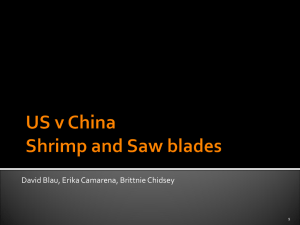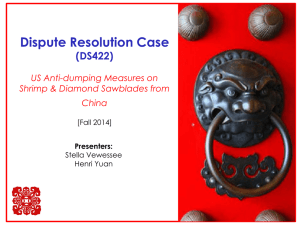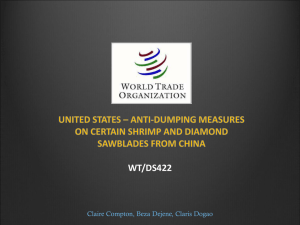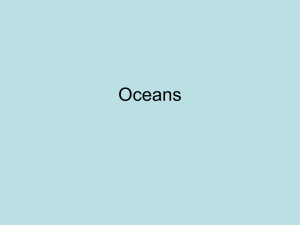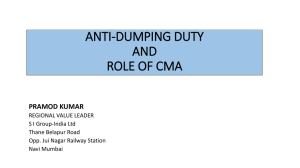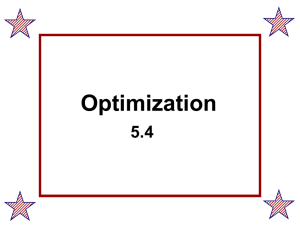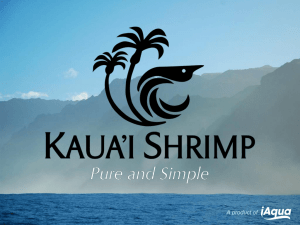team presentation. - International Trade Relations
advertisement
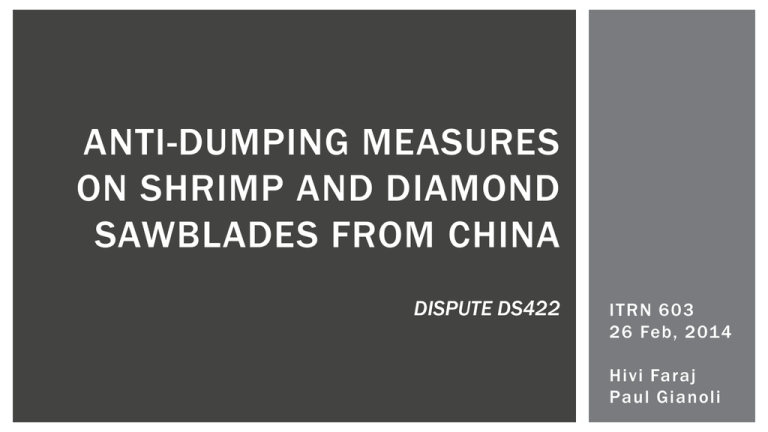
ANTI-DUMPING MEASURES ON SHRIMP AND DIAMOND SAWBLADES FROM CHINA DISPUTE DS422 ITRN 603 26 Feb, 2014 Hivi Faraj Paul Gianoli HISTORY & CONTEXT 2 TIMELINE OF US’ ACTIONS In 2004: shrimp the USDOC started an anti dumping investigation on frozen and canned shrimp Publish shrimp final determination calculating dumping margins on responsible parties In 2005: An anti Dumping measure went into effect An anti-dumping duty order on shrimp Begins an anti-dumping investigation on sawblades In 2006: sawblades Release a final determination of injury In 2009: Anti-dumping measure goes into effect for sawblades 3 TIMELINE OF DSU CASE Februar y 2011: China f iles complaint requesting consultation with US regarding anti -dumping measures on cer tain frozen warmwater shrimp China stated that the use of zeroing increased dumping margins for Chinese companies exporting shrimp China alleged USDOC zeroing practice is inconsistent with 1994 GATT A rticle VI July 2011: C h i n a r e q u e s te d a d d i t i o n al c o n s ul t a t i o n s o n z e r o i n g p r a c t i c e r e l a te d to a n t i - d um p in g m e a s u r e s o n d i a m o n d s aw b l a d e s a n d p a r t s . October 2011: China requested establishment of panel and DSB established a panel The EU, Japan, Honduras, Korea, Thailand and Vietnam reserved third party rights. December 2011: Panel established June 201 2: Panel repor t distributed 4 REACTIONS US unhappy with China filing formal complaint: “The United States is deeply disappointed in China’s decision to request consultations. Members have called for the United States to come into compliance with the WTO rulings on zeroing. In December, the Department of Commerce issued a proposal to end zeroing in administrative reviews, the core issue on which the Government of China has today requested consultations…” (USTR Feb 2011) 5 MAIN WTO ISSUE 6 CONTESTED ISSUE INVOLVED The US anti-dumping measures on shrimp and sawblades from China: Anti-Dumping measures: Government takes such measures to protect domestic producers Tariffs are imposed to make up for the price difference Tariffs can be more than 100 percent in the US Zeroing: Method used by the USDOC to calculate dumping margins on foreign importers that engage in dumping If one foreign producer engages in the act then the USDOC investigates the entire industry 7 “ZEROING” Practice of USDOC in developing anti dumping margins Eliminates negative dumping margins Can “create dumping margins out of thin air” PUDD: “Potentially Uncollected Dumping Duties” Source: Cato Institute 8 USDOC USE OF ZEROING “Original Investigation” vs “Administrative Review” WTO summary of DS422: “…the USDOC’s use of zeroing in the original investigation and several administrative reviews to calculate dumping margins…” USDOC ceased zeroing in original investigations in Dec. 2006 Only prospectively—does not recalculate A/D margins already in place (Prusa) April 16, 2012 – USDOC discontinues “zeroing” in calculating dumping margins in administrative reviews Results in recalculation of A/D margins during reviews of prior investigations 9 SPECIFIC WTO AGREEMENT INVOLVED Article VI of the GATT 1947: “2. In order to offset or prevent dumping, a contracting party may levy on any dumped product an anti-dumping duty not greater than the margin of dumping in respect of such product.” Agreement on Implementation of Article VI of the General Agreement on Tariffs and Trade GATT 1994 Article 2.4: “A fair comparison shall be made between the export price and the normal value…” Article 2.4.2: “…the existence of margins of dumping during the investigation phase shall normally be established on the basis of a comparison of a weighted average normal value with a weighted average of prices of all comparable export transactions or by a comparison of normal value and export prices on a transaction-to-transaction basis…” 10 CONSISTENT WITH WTO OBLIGATIONS? Consensus: the use of zeroing in the USDOC’s methodology for developing anti-dumping margins is inconsistent with the country’s W TO obligations. 11 POSITION OF THE MAIN PARTIES 12 POSITION OF CHINA Accused the US of allegedly using zeroing to determine its anti dumping margin Used to determine A/D margin for shrimp Used to determine “Separate Rate” “Since the dumping margins for relevant mandatory respondents were calculated with and impacted by the application of ‘zeroing’, the Separate Rate calculated on that basis was also affected by the application of ‘zeroing’.” (DS 422 first written submission from China) Used to determine A/D margin for sawblades Use of zeroing is in violation of 1994 GATT ar ticles on anti dumping measures 1,2.1, 2.4., 2.4.2, 5.8, 9.2, 9.3 and 9.4 of Anti dumping act China argued that the zeroing resulted in inflated anti -dumping margins for Chinese products, and thus higher duties. 13 POSITION OF USA No formal rebuttals Not happy with the complaint filed by China Already in the process of discontinuing the practice of zeroing in administrative reviews W TO puts pressure on the US because of its use of zeroing The US did not contest the claims made by China on its use of zeroing 14 THE DECISION (RECOMMENDATION) 15 THE DECISION (RECOMMENDATION) Zeroing The Panel found that the “zeroing” methodology used by the USDOC in calculating the margins of dumping in the three anti -dumping investigations at issue was inconsistent with Article 2.4.2 of the Anti Dumping Agreement, and therefore concluded that the United States had acted inconsistently with its obligations under this provision. Separate Rate The Panel rejected China's claim concerning the separate rate, but noted that the calculation of the separate rate on the basis of individual margins calculated with zeroing necessarily incorporated the WTO-inconsistent zeroing methodology 16 IMPLEMENTATION & SANCTIONS 17 IMPLEMENTATION & SANCTIONS 23 July 201 2 US informs the DSB of its intention to implement the DSB recommendations and rulings Establishes 8-month reasonable period of time (expires 23 March 2013) 5 September 201 2 USTR requests USDOC to take action necessary to implement the DSB recommendations and rulings 7 December 201 2 USDOC issues the memorandum in which the Department recalculated the weighted-average dumping margins from the antidumping investigation of shrimp from China (calculated without the use of zeroing) 17 December 201 2 USDOC issues the memorandum in which the Department recalculated one of the weighted-average dumping margins from the antidumping investigation of sawblades from China (calculated without the use of zeroing) 18 IMPLEMENTATION & SANCTIONS USDOC invites comments from interested par ties for both shrimp and sawblades 4 March 2013 USDOC issues its final section 129 determinations after receiving comments and rebuttal comments from the interested parties in both cases No changes to recalculated rates 22 March 2013 USTR instructs USDOC to implement its determinations under section 129 26 March 2013 US informs the WTO DSB that it has implemented the DSB recommendations and rulings within the reasonable period of time. China states that it does not share the US' view that it had fully implemented the DSB recommendations because it had “failed to revoke the anti-dumping duty on sawblades.” China urges the United States to honor its obligation. 19 OBSERVATIONS 20 OBSERVATIONS General Obser vations Lack of reaction from the US confirms illegal actions More reaction from China related to the case China’s success encourages other nations to take disputes to WTO Last word on USDOC’s legacy of zeroing? Prior cases involving zeroing DS402 DS383 DS350 DS344 ruled in favor of Korea in 2010 ruled in favor of Thailand in 2010 ruled in favor of European Communities in 2009 required an over -ruling of Appellate Body in favor of Mexico in 2007 Recently filed cases involving zeroing Warmwater Shrimp from Viet Nam – ongoing case involving question of zeroing Certain Steel Nails from China – filed new request for consultation Dec. 2013 21 OBSERVATIONS National and International Interests Significant to other countries exporting/looking to export to the US Highlights consequence of lack of specificity in international agreements Doha Round Rules negotiations need to adopt clear, precise rules in the Antidumping Agreement on the use of zeroing (USTR ) Specific methodology under scrutiny of international community with use clearly defined in agreements WTO Members need to agree on better implementation mechanisms (Ahn ) WTO Members must individually resort to the dispute settlement system in order to rectify USDOC’s zeroing practices Multiple successful cases — the international community successfully influenced US policy change on specific trade issue 22 THANK YOU 23 SOURCES Ahn, Dukgeun. Oct. 16, 2013. “US - Anti-Dumping Measures on Certain Shrimp and Diamond Sawblades from China: Never Ending Zeroing in the WTO?” [http://papers.ssrn.com/sol3/papers.cfm?abstract_id=2396297 (accessed Feb. 23, 2014)] Davis, Ryan. Jan 3, 2011. “Commerce Moves To End Zeroing On Most Exports.” Law360. [http://www.law360.com/articles/217690/commerce -moves-to-end-zeroing-on-most-exports (accessed Feb. 23, 2014)] “Certain Frozen Warmwater Shrimp From the People's Republic of China and Diamond Sawblades and Parts Thereof From the People's Republic of China: Notice of Implementation of Determinations Under Section 129 of the Uruguay Round Agreements Act and Parti al Revocation of the Antidumping Duty Orders .” Federal Register, Vol. 78, No. 60 (March 28, 2013), pp. Pages 18958-18960. Published by: Government Printing Office. [http://www.gpo.gov/fdsys/pkg/FR-2013-03-28/html/2013-07251.htm (accessed Feb. 23, 2014)] Ikenson, Daniel J. April 27, 2004. “Zeroing In: Antidumping’s Flawed Methodology under Fire.” CATO Institute. [http://www.cato.org/publications/free -trade-bulletin/zeroing-antidumpings-flawed-methodology-under-fire (accessed Feb. 23, 2014)] Prusa, Thomas J., and Luca Rubini. “United States –Use of Zeroing in Anti-Dumping Measures Involving Products from Korea: It’s deja vu all over again.” World Trade Review, Vol. 12, No. 2 (2013), pp. 409 –425. Published by: Cambridge Journals [http://econweb.rutgers.edu/prusa/cv/54%20 -%20Korea%20zeroing.pdf (accessed Feb. 23, 2014)] Smith, Lee. March 2012. “New Methodology To End Zeroing Practice Announced.” Trade & Manufacturing Alert. [http://www.kslaw.com/library/newsletters/TradeManufacturingAlert/2012/March/article4.html (accessed Feb. 23, 2014)] United States - Anti-Dumping Measures on Certain Shrimp and Diamond Sawblades from China. Feb. 9, 2012. Office of the United States Trade Representative. [http://www.ustr.gov/sites/default/files/Chn.Sub1_.ExecSum.%28for%20posting%29.pdf (accessed Feb . 22, 2014)] United States - Anti-Dumping Measures on Shrimp and Diamond Sawblades from China. March 26, 2013. WTO Dispute Settlement. [http://www.wto.org/english/tratop_e/dispu_e/cases_e/ds422_e.htm (accessed Feb. 22, 2014)] USTR Statement Regarding China's Decision to Request WTO Consultations on Shrimp Antidumping Measures. Feb 2011. Office of the United States Trade Representative. [http://www.ustr.gov/about-us/press-office/press-releases/2011/february/ustr-statementregarding-chinas-decision-request (accessed Feb. 22, 2014)] 24
